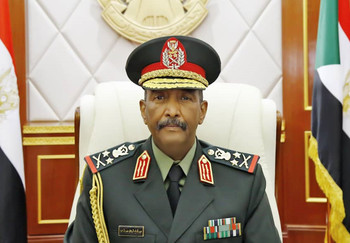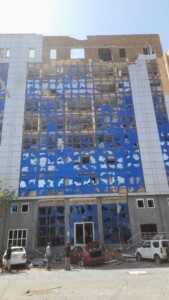El Burhan: Sudan Blue Nile agreement ‘first step to addressing all problems’

Chairman of Sudan’s Sovereignty Council and Commander of the Sudan Armed Forces Lt Gen Abdelfattah El Burhan (File photo: SUNA)
ED DAMAZIN –
A number of Blue Nile region community leaders signed a framework agreement document for peace and peaceful coexistence in Ed Damazin on Sunday. The president of the Sovereignty Council and army commander Lt Gen Abdelfattah El Burhan, rebel leader and member of the Sovereignty Council Malik Agar, and governor of Blue Nile region Ahmed El Omda were present at the ceremony in the state capital.
The agreement stipulates respect for the cultural and historical legacies of various communities in the region and commitment to preserving hawakeer, lands traditionally used by tribal communities.
In speeches during the signing ceremony, the native administration leaders reported that a joint committee of community leaders would be formed to follow up on the agreement’s implementation, which came into effect on Sunday afternoon.
El Burhan said that the signing event is the “first step” towards a final agreement that “addresses all problems.” He stressed that the Military Committee and the Peace and Reconciliation Council must take decisive action, calling for all parties to guard the agreement with weapons.
He called on the native administration leaders in the region to sit down together and address the issues of retribution and compensation in order to coexist. On Friday, the Darfur Bar Association (DBA) announced that it will visit those affected by the violence that broke out in Blue Nile region in July last year. Lawyers spoke about the continued attacks against people living south of El Roseires and in Wad El Mahi in the absence of the rule of law and the authorities’ disregard of their responsibilities towards the people in these areas.
El Mak El Fateh Adlan said that the framework agreement aims for dialogue between the various parties until a permanent agreement is reached. He said in his address to the ceremony that “great effort was made by the native administration leaders and 80 representatives of the people of the region with their different backgrounds, to prepare for the agreement”.
El Omda said that they intend to enact a law to criminalise racism and tribalism in the region. He stressed the need to combat hate speech on social media through the emergency law. In late December, native administration leaders of the Blue Nile region called for the replacement of the acting governor of the Blue Nile region because of his weak response to the ongoing crisis.
El Burhan also lauded the launch of an anti-drug campaign targeting young people, including soldiers, in the Blue Nile region. Five months ago, Radio Dabanga published a feature article on the under-reported issue of Sudan’s drug trade, corruption, and increased substance abuse, especially among youth.
Activists have since warned that an anti-drug clampdown by the current military junta could be used as a pretext to justify a clampdown on resistance committees and other pro-democracy activists or civil society groups.
During his address at the end of the shooting festival in Blue Nile region on Sunday morning, El Burhan said that the Sudanese army will eventually be under civilian leadership “once the appropriate conditions have been achieved.”
At the same time, he warned politicians against interfering in the army’s affairs, adding that “no one forces us to do anything, no embassy or else. Everything we do is in the interest of the country”.
El Burhan further denied recruiting mercenaries for war in another country, after Sudan deployed a large joint force of paramilitary Rapid Support Forces, army soldiers, and other Sudanese security forces along the border with the Central African Republic last week.











 and then
and then